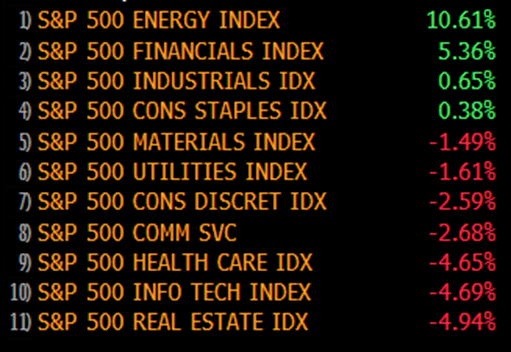Telemus Weekly Market Review January 3rd - January 7th, 2022
A Cold Blast to the New Year
In the Midwest this past week, weather conditions abruptly changed from mild winter weather to frozen tundra, almost instantaneously with the switch of the calendar into January. There was a similar shift in the markets as a new tax year ushered in a change in sentiment, beginning with the bond market then flowing into stocks. As for bonds, interest rates jumped as traders sold longer dated maturities, pushing rates higher. The yield on the 10-year Treasury rose a quarter of a percent with 2-year Treasuries up roughly half of that. While there was no direct linkage for why Treasuries moved so abruptly, concerns around inflation, hedge funds electing to short bonds, and a new tax year that reset the clock on realized gains collectively drove selling pressure in the bond market. The broad market barometer for bonds, the Bloomberg Barclays U.S. Aggregate index, finished the week -1.5% lower.
Rising rates bled into equity markets pushing growth stocks lower. The tech heavy NASDAQ composite fell a hard -4.5%, much lower than the -1.8% retracement in the S&P 500. Higher rates benefited value stocks, with Energy (+10.6%) and Financials (+5.4%) having very strong weeks. On the other side of the coin, real estate, technology, and healthcare each fell more than -4%.
S&P 500 Sector Returns, Week of January 3-7, 2022

Source: Bloomberg
Growth stocks tend to be adversely impacted by higher interest rates, whereas a subset of traditional value stocks, like bank and insurance companies, benefit from higher yields. While rates increased in 2021, the magnitude of rate increases was contained and ended up not deterring returns to growth stocks, which remained in favor. This week’s sharp rise in yields resulted in the 10-year Treasury sitting at its highest level since January of 2020. The shift higher in the yield curve negatively impact growth stocks this time around, while benefiting the likes of financials.
While it was an eventful and extreme week in terms of market rotation, it remains too early to call whether this week’s price action will transpire into a new trend. Value stocks shot higher to start 2021 and ended up fading after the first quarter.
The harsh start to for markets in 2022 has been driven by forceful repositioning in what appears to be a delayed reaction to the more aggressive posture from the Federal Reserve. Going into 2022 we expect a higher level of volatility than what transpired in 2021. We may not have expected this outcome from the onset, but it’s a natural reaction as investor postures evolve as we move from a stimulative to tighter monetary policy.
All opinions expressed in this article are for general informational purposes and constitute the judgment of the author(s) as of the date of the report. These opinions are subject to change without notice and are not intended to provide specific advice or recommendations for any individual or on any specific security. The material has been gathered from sources believed to be reliable, however Telemus Capital cannot guarantee the accuracy or completeness of such information, and certain information presented here may have been condensed or summarized from its original source. PAST PERFORMANCE IS NOT A GUARANTEE OF FUTURE RESULTS. Investment decisions should always be made based on the client's specific financial needs, goals and objectives, time horizon and risk tolerance. Current and future portfolio holdings are subject to risk. Risks may include interest-rate risk, market risk, inflation risk, deflation risk, currency risk, reinvestment risk, business risk, liquidity risk, financial risk, and cybersecurity risk. These risks are more fully described in Telemus Capital's Firm Brochure (Part 2A of Form ADV), which is available upon request. Telemus Capital does not guarantee the results of any investments. Investment, insurance and annuity products are not FDIC insured, are not bank guaranteed, and may lose value.
The S&P 500® is widely regarded as the best single gauge of large-cap U.S. equities. There is over USD 11.2 trillion indexed or benchmarked to the index, with indexed assets comprising approximately USD 4.6 trillion of this total. The index includes 500 leading companies and covers approximately 80% of available market capitalization. The Nasdaq Composite Index is a large market-cap-weighted index of more than 2,500 stocks, American depositary receipts (ADRs), and real estate investment trusts (REITs), among others. The Bloomberg Barclays US Aggregate Bond is a broad-based flagship benchmark that measures the investment grade, US dollar-denominated, fixed-rate taxable bond market. An index is not a security in which an investment can be made, as they are unmanaged vehicles that serve as market indicators only and do not account for the deduction of management fees and/or transaction costs generally associated with investable products. Advisory services are only offered to clients or prospective clients where Telemus and its representatives are properly licensed or exempt from licensure. No advice may be rendered by Telemus unless a client service agreement is in place. All composite data and corresponding calculations are available upon request.

Matt joined the Telemus team in 2018. As Chief Investment Officer, he leads the firms the investment process and research effort. Matt has experience as an equity analyst and portfolio manager and has advised corporate pension plans on their manager selection. He’s been quoted in Money Magazine and Barron’s.









